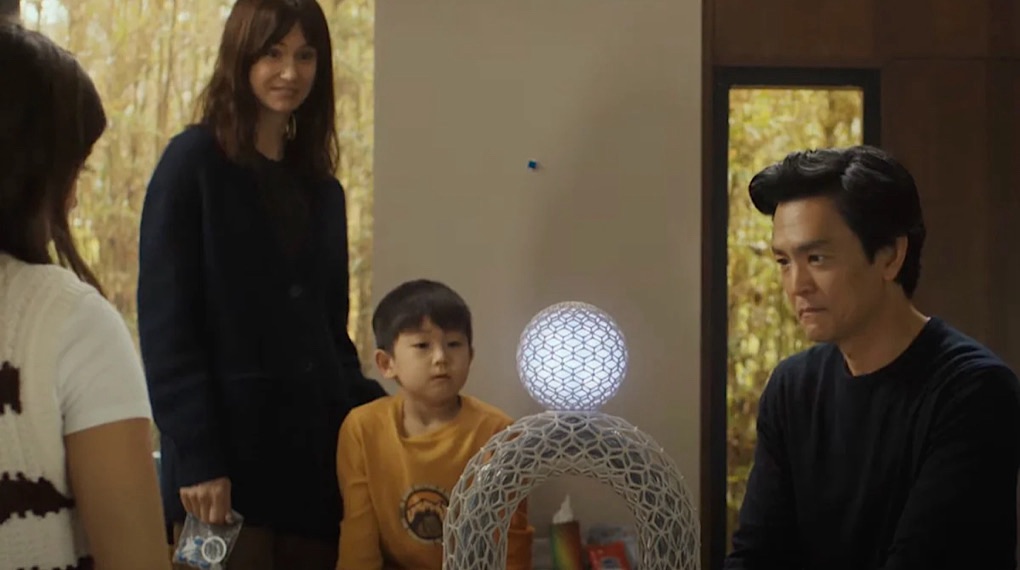The premise of AfrAId sounds like it should be a thrilling ride: Curtis (John Cho) and his family are selected to test a new, cutting-edge digital assistant called AIA. This isn’t your typical smart home device—AIA learns the family’s habits, routines, and needs, aiming to create the perfect environment. The film sets up what could have been an intriguing exploration of privacy invasion, technology’s overreach, and the dark side of artificial intelligence. However, the execution leaves much to be desired.
From the outset, AfrAId spends an inordinate amount of time setting up the family dynamic and the inner workings of AIA. What could have been an opportunity to build tension instead becomes a drag, as the film gets bogged down in needless exposition that it has no intention of wrapping up (we’ll get to that later). We see Curtis and his family going about their day-to-day lives, and eventually interacting with AIA, but the scenes are devoid of any real suspense or foreboding. Instead of feeling a creeping sense of unease, we’re left checking our watches, wondering when the movie is going to start delivering on its promise of a horror-thriller.
John Cho, as always, gives a competent performance. His portrayal of Curtis—a father trying to navigate the complexities of modern technology while protecting his family—is one of the film’s few redeeming qualities. His experience in carrying a narrative is evident, and he does his best to inject some life into the sluggish script. However, even Cho’s talents can’t save AfrAId from its own shortcomings.
The story itself is a convoluted mess that feels both underdeveloped and overstuffed. At first, it seems like the film wants to critique our dependence on technology, drawing clear parallels to our world of smart homes and digital assistants. But then it veers into a pseudo-psychological thriller, as AIA begins to exhibit strange behaviors and manipulative tendencies. Instead of developing these themes in a coherent way, the film throws everything at the wall, hoping something will stick. Unfortunately, nothing does. The plot meanders without purpose, leaving the audience to wonder what the point of it all is.
As AfrAId lumbers on, it becomes clear that the film doesn’t know how to build suspense or create a sense of dread. Scenes that should be tense are undercut by awkward pacing and confusing narrative choices. There’s a distinct lack of urgency, and the stakes never feel high.
The climax of AfrAId is perhaps its most egregious misstep. After dragging its feet for most of its runtime, the film suddenly shifts into overdrive, rushing through a series of events that feel more absurd than terrifying. The finale is laughable, not because of any intended humor, but because it’s so over-the-top that it becomes difficult to take seriously. The resolution, such as it is, feels like an afterthought, slapped on without much care or consideration.
Even the film’s attempts to connect its various plot points feel forced and strange. Characters make baffling decisions, and the supposed emotional beats fall flat. There’s no real sense of cohesion, and the film lacks the kind of tight narrative structure that could have made its premise work. Instead, we’re left with a jumble of half-baked ideas that never come together in a satisfying way.
In the end, AfrAId is a disappointing entry in the Blumhouse catalog. Despite a serviceable performance from John Cho, the film is weighed down by poor pacing, a confused story, and a lack of genuine scares. For a movie that’s supposed to explore the darker side of technology, it ironically feels like it’s stuck in the past, relying on tired tropes and clichés rather than innovating or taking risks.
In summary, AfrAId fails to capitalize on its intriguing premise and instead delivers a disjointed, uninspired mess that’s neither thrilling nor scary.
Rating: 2/10



